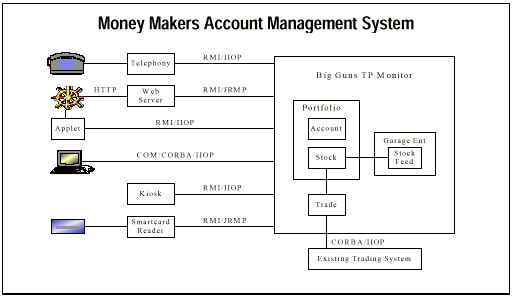

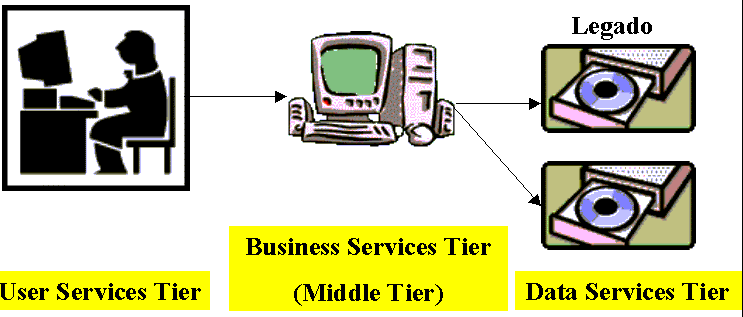
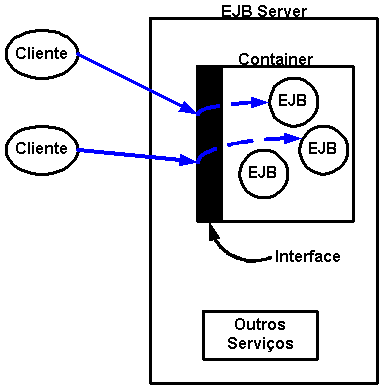
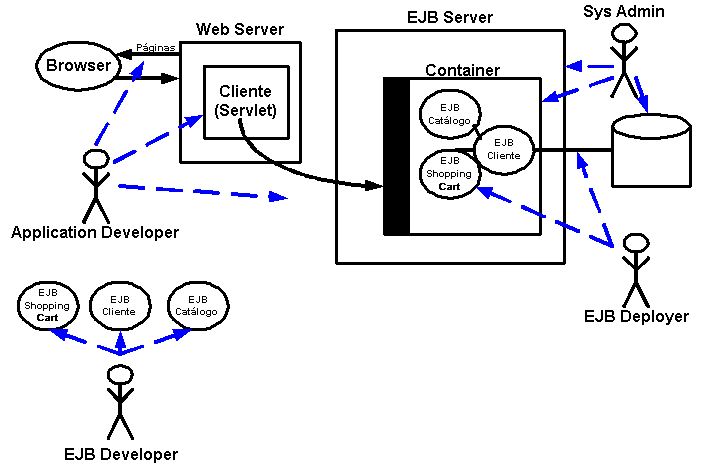
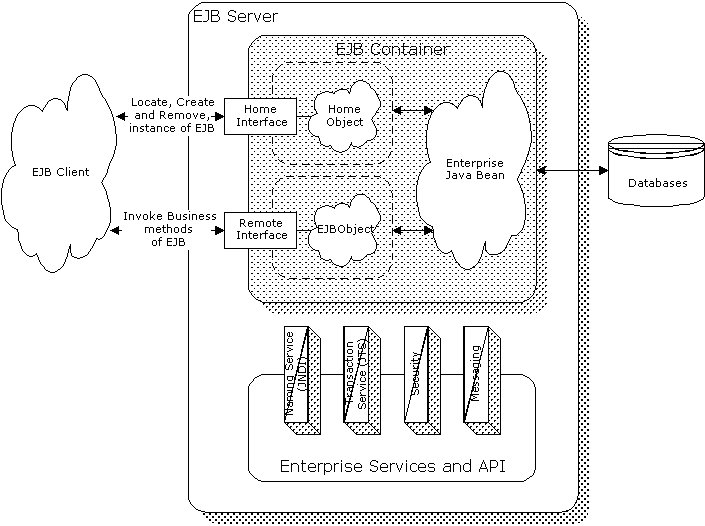
Característica |
Session Bean |
Entity Bean |
| O que o Bean representa |
|
|
| Tempo de vida |
|
|
| Atributos |
|
|
| Persistência (além da sessão) |
|
|
| Compartilhamento |
|
|
| Criação |
|
|
| Durabilidade |
|
|
| Transação |
|
|
| Exemplo |
|
|
Característica |
Stateful Session Bean |
Stateless Session Bean |
| Gerência de estado |
|
|
| Responsabilidades |
|
|
| Performance |
|
|
| Exemplo |
|
|
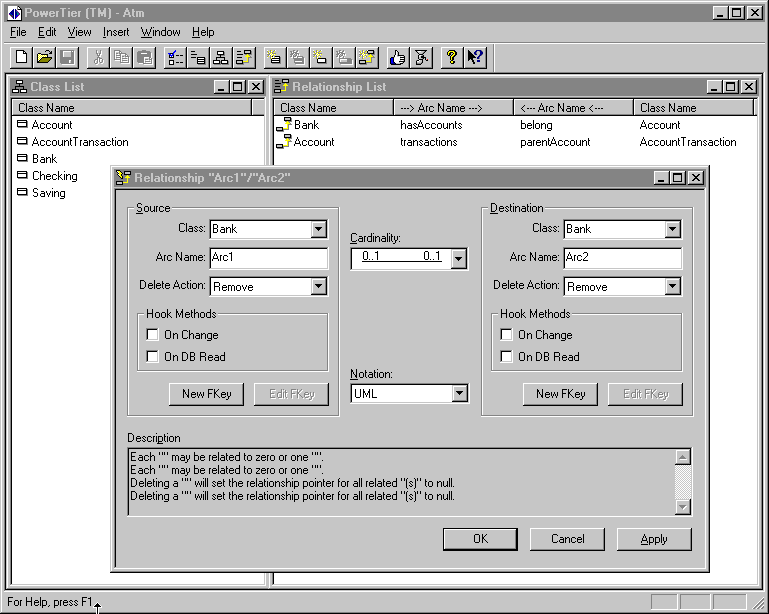
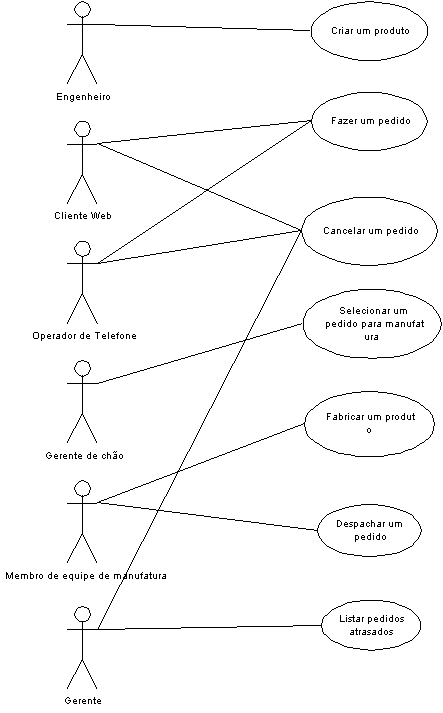
| Ator | Tipo de interface com usuário | Implementação do objeto de interface |
| Engenheiro | Visual Basic | Session Bean (RMI/IIOP) |
| Cliente Web | Aplicação Web/JSPs | JavaBean proxy/Session Bean |
| Operador de telefone | GUI Swing | Session Bean |
| Gerente de chão | Aplicação Web/JSPs | JavaBean proxy/Session Bean |
| Membro de equipe de manufatura | Palm Pilot com WAP/WML | Servlet acessando Session Bean |
| Gerente | Aplicação Web/JSPs | JavaBean proxy/Session Bean |
package factory.manage_orders;
import javax.ejb.*;
public interface ManageOrdersHome extends EJBHome
{
ManageOrders create() throws java.rmi.RemoteException,
javax.ejb.CreateException;
}
package factory.manage_orders;
import javax.ejb.*;
import java.util.Date;
import java.rmi.RemoteException;
import factory.order.OrderNotCancelableException;
public interface ManageOrders extends EJBObject
{
void placeOrder(int salesDivision, int orderNumber,
String product, Date dateDue)
throws RemoteException, NoSuchProductException,
DuplicateOrderException;
void cancelOrder(int salesDivision, int orderNumber)
throws RemoteException, NoSuchOrderException,
OrderNotCancelableException;
OverdueOrderView[] getOverdueOrders() throws RemoteException;
OpenOrderView[] getSchedulableOrders() throws RemoteException;
void createSampleProducts() throws RemoteException;
void createProduct(String id, String name) throws RemoteException;
void addRoutingInstruction(String id, int sequence, String instruction)
throws RemoteException;
}
package factory.manage_orders;
public class DuplicateOrderException extends Exception {
public DuplicateOrderException() {
}
}
package factory.manage_orders;
public class NoSuchOrderException extends Exception {
public NoSuchOrderException() {
}
}
package factory.manage_orders;
public class NoSuchProductException extends Exception {
public NoSuchProductException() {
}
}
package factory.manage_orders;
import java.io.Serializable;
import java.util.Date;
public class OpenOrderView implements Serializable {
public final int salesDivision;
public final int orderNumber;
public final String product;
public final Date dateDue;
public OpenOrderView(int salesDivision, int orderNumber,
String product, Date dateDue ) {
this.salesDivision = salesDivision;
this.orderNumber = orderNumber;
this.product = product;
this.dateDue = dateDue;
}
}
package factory.manage_orders;
import java.io.Serializable;
import java.util.Date;
public class OverdueOrderView implements Serializable {
public final int salesDivision;
public final int orderNumber;
public final String product;
public final String status;
public final Date dateDue;
public OverdueOrderView(int salesDivision, int orderNumber,
String product, String status, Date dateDue) {
this.salesDivision = salesDivision;
this.orderNumber = orderNumber;
this.product = product;
this.status = status;
this.dateDue = dateDue;
}
}
package factory.manufacture;
import javax.ejb.*;
import java.rmi.RemoteException;
public interface ManufactureHome extends EJBHome {
Manufacture create(String manufactureCellID)
throws RemoteException, CreateException;
}
package factory.manufacture;
import javax.ejb.*;
import java.rmi.RemoteException;
import factory.manage_orders.OpenOrderView;
import factory.manage_orders.NoSuchOrderException;
public interface Manufacture extends EJBObject {
OpenOrderView[] getOpenOrders() throws RemoteException;
void selectForManufacture(int salesDivision, int order_number)
throws RemoteException, NoSuchOrderException, BadStatusException;
boolean hasNextRouting() throws RemoteException, NoSelectionException;
String getNextRouting() throws RemoteException, NoSelectionException;
void ship(String carrier, int loading_dock)
throws RemoteException, NoSelectionException;
}
package factory.clients;
import java.rmi.RemoteException;
import javax.ejb.*;
import javax.naming.*;
import javax.rmi.PortableRemoteObject;
import java.util.Properties;
import factory.manage_orders.ManageOrders;
import factory.manage_orders.ManageOrdersHome;
public class CreateProducts {
public static void main(String[] args) {
try {
ContextPropertiesFactory factory = new ContextPropertiesFactory();
Properties prop = factory.getInitialContextProperties();
InitialContext initial = new InitialContext(prop);
//InitialContext initial = new InitialContext();
Object homeObject = initial.lookup("ManageOrders");
ManageOrdersHome home = (ManageOrdersHome)
PortableRemoteObject.narrow(homeObject, ManageOrdersHome.class);
ManageOrders manageOrders = home.create();
manageOrders.createSampleProducts();
} catch(RemoteException re) {
re.printStackTrace();
} catch(NamingException ne) {
ne.printStackTrace();
} catch(CreateException ce) {
ce.printStackTrace();
}
}
}
package factory.clients;
import javax.naming.Context;
import java.util.Properties;
public class ContextPropertiesFactory {
public Properties getInitialContextProperties() {
Properties prop = new Properties();
prop.setProperty(Context.INITIAL_CONTEXT_FACTORY,
"com.evermind.server.ApplicationClientInitialContextFactory");
prop.setProperty(Context.PROVIDER_URL, "ormi://localhost/factory");
prop.setProperty(Context.SECURITY_PRINCIPAL, "admin");
prop.setProperty(Context.SECURITY_CREDENTIALS, "123");
return prop;
}
public void makePropertiesDefault() {
System.setProperties( getInitialContextProperties() );
}
}
package factory.clients;
import java.rmi.RemoteException;
import javax.ejb.*;
import javax.naming.*;
import javax.rmi.PortableRemoteObject;
import java.util.Properties;
import java.util.Calendar;
import java.util.Date;
import factory.manage_orders.ManageOrders;
import factory.manage_orders.ManageOrdersHome;
public class PlaceSampleOrders {
private static final int SALES_DIVISION_1 = 1;
private static final int SALES_DIVISION_2 = 2;
private static final int SALES_DIVISION_3 = 3;
private static final int ORDER_1 = 1;
private static final int ORDER_2 = 2;
private static final int ORDER_3 = 3;
private static final int ORDER_4 = 4;
private static final int ORDER_5 = 5;
private static final String PRODUCT_1 = "DESK01";
private static final String PRODUCT_2 = "CHAIR01";
private static final String PRODUCT_3 = "LAMP01";
public static void main(String[] args) {
try {
ContextPropertiesFactory factory = new ContextPropertiesFactory();
Properties prop = factory.getInitialContextProperties();
InitialContext initial = new InitialContext(prop);
//InitialContext initial = new InitialContext();
Object homeObject = initial.lookup("ManageOrders");
ManageOrdersHome home = (ManageOrdersHome)
PortableRemoteObject.narrow(homeObject, ManageOrdersHome.class);
ManageOrders manageOrders = home.create();
Calendar calendarNotSchedulable = Calendar.getInstance();
calendarNotSchedulable.add(Calendar.DAY_OF_YEAR, 14);
Calendar calendarSchedulable = Calendar.getInstance();
calendarSchedulable.add(Calendar.DAY_OF_YEAR, 5);
Calendar calendarOverdue = Calendar.getInstance();
manageOrders.placeOrder(SALES_DIVISION_1, ORDER_1, PRODUCT_1,
calendarNotSchedulable.getTime());
manageOrders.placeOrder(SALES_DIVISION_2, ORDER_1, PRODUCT_2,
calendarNotSchedulable.getTime());
manageOrders.placeOrder(SALES_DIVISION_1, ORDER_2, PRODUCT_3,
calendarSchedulable.getTime());
manageOrders.placeOrder(SALES_DIVISION_2, ORDER_2, PRODUCT_1,
calendarSchedulable.getTime());
manageOrders.placeOrder(SALES_DIVISION_1, ORDER_3, PRODUCT_2,
calendarOverdue.getTime());
manageOrders.placeOrder(SALES_DIVISION_2, ORDER_3, PRODUCT_3,
calendarOverdue.getTime());
} catch(Exception e) {
e.printStackTrace();
}
}
}
package factory.clients;
import java.rmi.RemoteException;
import javax.ejb.*;
import javax.naming.*;
import javax.rmi.PortableRemoteObject;
import java.util.Properties;
import factory.manage_orders.ManageOrders;
import factory.manage_orders.ManageOrdersHome;
import factory.manage_orders.OverdueOrderView;
import factory.manage_orders.OpenOrderView;
public class ManageSampleOrders {
public static void main(String[] args) {
try {
ContextPropertiesFactory factory = new ContextPropertiesFactory();
Properties prop = factory.getInitialContextProperties();
InitialContext initial = new InitialContext( prop );
Object homeObject = initial.lookup("ManageOrders");
ManageOrdersHome home = (ManageOrdersHome)
PortableRemoteObject.narrow(homeObject, ManageOrdersHome.class);
ManageOrders manageOrders = home.create();
// List overdue orders
OverdueOrderView[] overdueOrders = manageOrders.getOverdueOrders();
for(int iter = 0; iter < overdueOrders.length; iter++) {
OverdueOrderView overdueOrder = overdueOrders[iter];
System.out.println("Product " + overdueOrder.product +
" is due on " + overdueOrder.dateDue +
". It's status is " + overdueOrder.status
+ ".");
}
// Cancel first overdue order
if(overdueOrders.length > 0) {
OverdueOrderView overdueOrder = overdueOrders[0];
System.out.println("About to cancel an order...");
try {
manageOrders.cancelOrder(overdueOrder.salesDivision,
overdueOrder.orderNumber );
System.out.println("Canceled order for " +
overdueOrder.product.trim() + ".");
} catch(factory.manage_orders.NoSuchOrderException nsoe) {
System.out.println("Failed to find order.");
} catch(factory.order.OrderNotCancelableException once) {
System.out.println("Cannot cancel an order in production.");
}
}
} catch(RemoteException re) {
re.printStackTrace();
} catch(NamingException ne) {
ne.printStackTrace();
} catch(CreateException ce) {
ce.printStackTrace();
}
}
}
public class BeginManufacture {
private static final String MANUFACTURE_CELL = "Station1";
...
ContextPropertiesFactory factory = new ContextPropertiesFactory();
Properties prop = factory.getInitialContextProperties();
InitialContext initial = new InitialContext(prop);
Object homeObject = initial.lookup("Manufacture");
ManufactureHome home = (ManufactureHome)
PortableRemoteObject.narrow(homeObject, ManufactureHome.class);
Manufacture manufacture = home.create(MANUFACTURE_CELL);
...
// primeiro, alguém salva um handle para um session bean existente
private static final String FILE_NAME = "C:/current_product.ser";
...
Handle handle = manufacture.getHandle();
FileOutputStream file_out = new FileOutputStream(FILE_NAME);
ObjectOutputStream out = new ObjectOutputStream(file_out);
out.writeObject(handle);
System.out.println("Written object for next stage.");
...
// em outro programa, obtém-se o handle de volta
FileInputStream inStream = new FileInputStream(FILE_NAME);
ObjectInputStream in = new ObjectInputStream(inStream);
Handle handle = (Handle) in.readObject();
Manufacture manufacture = (Manufacture)
PortableRemoteObject.narrow(handle.getEJBObject(),
Manufacture.class);
package factory.clients;
import java.rmi.RemoteException;
import javax.ejb.*;
import javax.naming.*;
import javax.rmi.PortableRemoteObject;
import java.util.Properties;
import java.io.*;
import factory.manufacture.Manufacture;
import factory.manufacture.ManufactureHome;
import factory.manage_orders.OpenOrderView;
public class BeginManufacture {
private static final String MANUFACTURE_CELL = "Station1";
private static final String FILE_NAME = "C:/current_product.ser";
public static void main(String[] args) {
try {
ContextPropertiesFactory factory = new ContextPropertiesFactory();
Properties prop = factory.getInitialContextProperties();
InitialContext initial = new InitialContext(prop);
Object homeObject = initial.lookup("Manufacture");
ManufactureHome home = (ManufactureHome)
PortableRemoteObject.narrow(homeObject, ManufactureHome.class);
Manufacture manufacture = home.create(MANUFACTURE_CELL);
OpenOrderView[] openOrders = manufacture.getOpenOrders();
if(openOrders.length == 0) {
System.out.println("Nothing to make; go home.");
return;
}
System.out.println("Selecting from the following open orders:");
for(int iter = 0; iter < openOrders.length; iter++) {
OpenOrderView openOrder = openOrders[iter];
System.out.println("Sales Division: " + openOrder.salesDivision +
"; Order #: " + openOrder.orderNumber +
"; Product: " + openOrder.product + "Date due: "
+ openOrder.dateDue );
}
// Get the first open order
for (int iterFind = 0; iterFind < openOrders.length; iterFind++) {
try {
OpenOrderView openOrder = openOrders[iterFind];
manufacture.selectForManufacture(
openOrder.salesDivision, openOrder.orderNumber);
Handle handle = manufacture.getHandle();
FileOutputStream file_out = new FileOutputStream(FILE_NAME);
ObjectOutputStream out = new ObjectOutputStream(file_out);
out.writeObject(handle);
System.out.println("Written object for next stage.");
break;
} catch(factory.manufacture.BadStatusException bse) {
// Someone grabbed it before we did
bse.printStackTrace();
}
}
} catch (FileNotFoundException fnfe) {
fnfe.printStackTrace();
} catch (RemoteException re) {
re.printStackTrace();
} catch (IOException ioe) {
ioe.printStackTrace();
} catch (factory.manage_orders.NoSuchOrderException nsoe) {
nsoe.printStackTrace();
} catch (NamingException ne) {
ne.printStackTrace();
} catch (CreateException ce) {
ce.printStackTrace();
}
}
}
package factory.clients;
import java.rmi.RemoteException;
import javax.ejb.*;
import javax.naming.*;
import javax.rmi.PortableRemoteObject;
import java.util.Properties;
import java.io.*;
import factory.manufacture.Manufacture;
import factory.manufacture.ManufactureHome;
import factory.manage_orders.OpenOrderView;
public class CompleteManufacture {
private static final String FILE_NAME = "c:/current_product.ser";
private static final String CARRIER = "State Express";
private static final int LOADING_DOCK = 1;
public static void main(String[] args) {
try {
ContextPropertiesFactory factory = new ContextPropertiesFactory();
factory.makePropertiesDefault();
FileInputStream inStream = new FileInputStream(FILE_NAME);
ObjectInputStream in = new ObjectInputStream(inStream);
Handle handle = (Handle) in.readObject();
Manufacture manufacture = (Manufacture)
PortableRemoteObject.narrow(handle.getEJBObject(),
Manufacture.class);
System.out.println("Product routings:");
while(manufacture.hasNextRouting()) {
String routing = manufacture.getNextRouting();
System.out.println(routing);
}
System.out.println("Product finished; shipping...");
manufacture.ship(CARRIER, LOADING_DOCK);
manufacture.remove();
} catch(Exception e) {
e.printStackTrace();
} catch(Throwable t) {
t.printStackTrace();
}
}
}
package factory.manage_orders;
import javax.ejb.*;
import javax.naming.*;
import javax.rmi.PortableRemoteObject;
import java.rmi.RemoteException;
import java.util.Date;
import java.util.Collection;
import java.util.Iterator;
import java.util.LinkedList;
import factory.order.OrderHome;
import factory.order.Order;
import factory.order.OrderPK;
import factory.order.StatusStrings;
import factory.product.Product;
import factory.product.ProductHome;
import factory.product.RoutingInstruction;
import factory.order.OrderNotCancelableException;
public class ManageOrdersEJB implements SessionBean
{
private static final int MILLIS_IN_DAYS = 86400000;
// Business methods
public void placeOrder(int salesDivision, int orderNumber,
String productName, Date dateDue)
throws NoSuchProductException, DuplicateOrderException {
try {
// Find the product
ProductHome productHome = getProductHome();
Product product = productHome.findByPrimaryKey(productName);
// create the order
OrderHome orderHome = getOrderHome();
orderHome.create(salesDivision, orderNumber, product, dateDue);
}
catch(NamingException ne) {
throw new EJBException(ne);
} catch(RemoteException re) {
throw new EJBException(re);
} catch (FinderException fe) {
if(fe instanceof ObjectNotFoundException)
throw new NoSuchProductException();
else
throw new EJBException(fe); // Erro de sistema, não da aplicação
} catch(CreateException ce) {
if(orderExists(salesDivision, orderNumber))
throw new DuplicateOrderException();
else
throw new EJBException(ce);
}
}
public void cancelOrder(int salesDivision, int orderNumber)
throws NoSuchOrderException, OrderNotCancelableException {
try {
// Find the order
OrderHome orderHome = getOrderHome();
OrderPK orderPK = new OrderPK(salesDivision, orderNumber);
// Cancel it
Order order = orderHome.findByPrimaryKey(orderPK);
order.cancelOrder();
} catch(NamingException ne) {
throw new EJBException(ne);
} catch(RemoteException re) {
throw new EJBException(re);
} catch(FinderException fe) {
if(fe instanceof ObjectNotFoundException)
throw new NoSuchOrderException();
else
throw new EJBException(fe);
}
}
public OverdueOrderView[] getOverdueOrders() {
try {
LinkedList overdueOrders = new LinkedList();
Date today = new Date();
long todayMillis = today.getTime();
long leadTimeMillis = getLeadTimeDays() * MILLIS_IN_DAYS;
OrderHome orderHome = getOrderHome();
Collection uncompletedOrders = orderHome.findUncompletedOrders();
Iterator iterUncompletedOrders = uncompletedOrders.iterator();
while(iterUncompletedOrders.hasNext()) {
Order uncompletedOrder = (Order)
PortableRemoteObject.narrow(iterUncompletedOrders.next(),
Order.class);
Date dateDue = uncompletedOrder.getDateDue();
String status = uncompletedOrder.getStatus();
long dueDateMillis = dateDue.getTime();
if(
(status.equals(StatusStrings.OPEN) &&
(todayMillis + leadTimeMillis > dueDateMillis))
||
(status.equals(StatusStrings.IN_PROCESS) &&
(todayMillis > dueDateMillis))
) {
OverdueOrderView view = new OverdueOrderView(
uncompletedOrder.getSalesDivision(),
uncompletedOrder.getOrderNumber(),
uncompletedOrder.getProductOrdered().getName(),
status, dateDue);
overdueOrders.add(view);
}
}
OverdueOrderView[] overdue = new OverdueOrderView[
overdueOrders.size()];
return (OverdueOrderView[]) overdueOrders.toArray(overdue);
} catch(NamingException ne) {
throw new EJBException(ne);
} catch(RemoteException re) {
throw new EJBException(re);
} catch(FinderException fe) {
throw new EJBException(fe);
}
}
public OpenOrderView[] getSchedulableOrders() {
try {
LinkedList schedulableOrders = new LinkedList();
Date today = new Date();
long todayMillis = today.getTime();
long maxInventoryTimeMillis = getMaxInventoryTimeDays() *
MILLIS_IN_DAYS;
long leadTimeMillis = getLeadTimeDays() * MILLIS_IN_DAYS;
OrderHome orderHome = getOrderHome();
Collection openOrders = orderHome.findOpenOrders();
Iterator iterOpenOrders = openOrders.iterator();
while(iterOpenOrders.hasNext()) {
Order openOrder = (Order)
PortableRemoteObject.narrow(iterOpenOrders.next(),
Order.class);
Date dateDue = openOrder.getDateDue();
long dueDateMillis = dateDue.getTime();
if(todayMillis >= dueDateMillis - leadTimeMillis - maxInventoryTimeMillis) {
OpenOrderView view = new OpenOrderView(
openOrder.getSalesDivision(),
openOrder.getOrderNumber(),
openOrder.getProductOrdered().getName(),
dateDue);
schedulableOrders.add(view);
}
}
OpenOrderView[] schedulable =
new OpenOrderView[schedulableOrders.size()];
return (OpenOrderView[]) schedulableOrders.toArray(schedulable);
} catch(NamingException ne) {
throw new EJBException(ne);
} catch(RemoteException re) {
throw new EJBException(re);
} catch(FinderException fe) {
throw new EJBException(fe);
}
}
public void createSampleProducts() {
try {
ProductHome productHome = getProductHome();
// Create three sample products
ProductCreationHelper pch = new ProductCreationHelper(productHome);
pch.createAll();
} catch(NamingException ne) {
throw new EJBException(ne);
}
}
public void createProduct(String id, String name) {
try {
ProductHome productHome = getProductHome();
productHome.create(id, name, new RoutingInstruction[]{});
} catch(NamingException ne) {
throw new EJBException(ne);
} catch(CreateException ce) {
throw new EJBException(ce);
} catch (RemoteException re) {
throw new EJBException(re);
}
}
public void addRoutingInstruction(String id, int sequence,
String instruction) {
try {
ProductHome productHome = getProductHome();
Product product = productHome.findByPrimaryKey(id);
product.addRoutingInstruction(sequence, instruction);
} catch(FinderException fe) {
throw new EJBException(fe);
} catch(NamingException ne) {
throw new EJBException(ne);
} catch(RemoteException re) {
throw new EJBException(re);
}
}
package factory.manage_orders;
import javax.ejb.EJBException;
import factory.product.Product;
import factory.product.ProductHome;
import factory.product.RoutingInstruction;
import factory.product.NoSuchRoutingInstruction;
public class ProductCreationHelper {
ProductHome productHome;
public ProductCreationHelper(ProductHome productHome) {
this.productHome = productHome;
}
public void createAll() {
try {
createDesk();
createChair();
createLamp();
} catch(Exception e) {
e.printStackTrace();
throw new EJBException(e);
}
}
public void createDesk() throws Exception {
RoutingInstruction compress = new RoutingInstruction(5,
"Compress the wood.");
RoutingInstruction stain = new RoutingInstruction(10,
"Stain the wood.");
RoutingInstruction assemble = new RoutingInstruction(15,
"Assemble the desk.");
RoutingInstruction[] routings = new RoutingInstruction[]{
compress, stain, assemble};
productHome.create("DESK01", "Compressed Wood Desk", routings);
}
public void createChair() throws Exception {
RoutingInstruction extrude = new RoutingInstruction(5,
"Extrude plastic.");
RoutingInstruction glue = new RoutingInstruction(10,
"Glue together.");
RoutingInstruction paint = new RoutingInstruction(15,
"Spraypaint.");
RoutingInstruction[] routings = new RoutingInstruction[]{
extrude, glue, paint};
productHome.create("CHAIR01", "Quality Plastic Chair", routings);
}
public void createLamp() throws Exception {
RoutingInstruction getBulb = new RoutingInstruction(5,
"Get bulb from inventory.");
RoutingInstruction getLamp = new RoutingInstruction(10,
"Get lamp from inventory.");
RoutingInstruction screwTogether = new RoutingInstruction(15,
"Screw together.");
RoutingInstruction frayCord = new RoutingInstruction(20,
"Pre-fray the cord");
RoutingInstruction[] routings = new RoutingInstruction[]{
getBulb, getLamp, screwTogether,
frayCord};
Product lamp = productHome.create("LAMP01", "Custom Made Lamp",
routings);
try {
lamp.deleteRoutingInstruction(21);
} catch(NoSuchRoutingInstruction nsri) {
lamp.deleteRoutingInstruction(20);
}
}
}
private boolean orderExists(int salesDivision, int orderNumber) {
try {
OrderHome orderHome = getOrderHome();
OrderPK orderPK = new OrderPK(salesDivision, orderNumber);
Order order = orderHome.findByPrimaryKey(orderPK);
return true;
} catch(Exception e) {
return false;
}
}
private int getLeadTimeDays() throws NamingException {
InitialContext initial = new InitialContext();
Integer leadTimeDays = (Integer)
initial.lookup("java:comp/env/lead_time");
// A null pointer will roll back the transaction
return leadTimeDays.intValue();
}
private int getMaxInventoryTimeDays() throws NamingException {
InitialContext initial = new InitialContext();
Integer inventoryTimeDays = (Integer)initial.lookup(
"java:comp/env/max_inventory_time");
// A null pointer will roll back the transaction
return inventoryTimeDays.intValue();
}
private ProductHome getProductHome() throws NamingException {
InitialContext initial = new InitialContext();
ProductHome home = (ProductHome)
javax.rmi.PortableRemoteObject.narrow(
initial.lookup("java:comp/env/ejb/Product"),
ProductHome.class );
return home;
}
private OrderHome getOrderHome() throws NamingException {
InitialContext initial = new InitialContext();
OrderHome home = (OrderHome)javax.rmi.PortableRemoteObject.narrow(
initial.lookup("java:comp/env/ejb/Order"),
OrderHome.class );
return home;
}
<env-entry>
<env-entry-name>lead_time</env-entry-name>
<env-entry-type>java.lang.Integer</env-entry-type>
<env-entry-value>3</env-entry-value>
</env-entry>
<env-entry>
<env-entry-name>max_inventory_time</env-entry-name>
<env-entry-type>java.lang.Integer</env-entry-type>
<env-entry-value>10</env-entry-value>
</env-entry>
<ejb-ref>
<ejb-ref-name>ejb/Order</ejb-ref-name>
<ejb-ref-type>Entity</ejb-ref-type>
<home>factory.order.OrderHome</home>
<remote>factory.order.Order</remote>
<ejb-link>Orders</ejb-link>
</ejb-ref>
<ejb-ref>
<ejb-ref-name>ejb/Product</ejb-ref-name>
<ejb-ref-type>Entity</ejb-ref-type>
<home>factory.product.ProductHome</home>
<remote>factory.product.Product</remote>
<ejb-link>Product</ejb-link>
</ejb-ref>
public void ejbCreate() {}
public void ejbActivate() {}
public void ejbPassivate() {}
public void ejbRemove() {}
public void setSessionContext(SessionContext ctx) {}
} // fim da classe ManageOrdersEJB
package factory.manufacture;
import javax.ejb.*;
import javax.naming.*;
import java.rmi.RemoteException;
import java.sql.Connection;
import java.sql.SQLException;
import java.sql.PreparedStatement;
import javax.sql.DataSource;
import java.util.Arrays;
import java.util.List;
import java.util.Collections;
import java.util.Iterator;
import java.util.Date;
import factory.product.Product;
import factory.product.ProductHome;
import factory.order.Order;
import factory.order.OrderHome;
import factory.order.OrderPK;
import factory.order.StatusStrings;
import factory.manage_orders.OpenOrderView;
import factory.manage_orders.ManageOrders;
import factory.manage_orders.ManageOrdersHome;
import factory.manage_orders.NoSuchOrderException;
import factory.product.RoutingInstruction;
public class ManufactureEJB implements SessionBean {
// properties
public String manufactureCellID;
public List routingInstructions;
public int currentPosition;
public int lastPosition;
public boolean orderSelected;
public int selectedSalesDivision;
public int selectedOrderNumber;
// Framework & lifecycle methods
public void ejbCreate(String manufactureCellID) {
this.manufactureCellID = manufactureCellID;
orderSelected = false;
}
public void ejbActivate() {}
public void ejbPassivate() {}
public void ejbRemove() {}
public void setSessionContext(SessionContext ctx) {}
// Business methods
public OpenOrderView[] getOpenOrders() {
try {
ManageOrdersHome homeManageOrders = getManageOrdersHome();
ManageOrders manageOrders = homeManageOrders.create();
return manageOrders.getSchedulableOrders();
} catch(NamingException ne) {
throw new EJBException(ne);
} catch(RemoteException re) {
throw new EJBException(re);
} catch(CreateException ce) {
throw new EJBException(ce);
}
}
public void selectForManufacture(int salesDivision, int order_number)
throws NoSuchOrderException, BadStatusException {
try {
OrderHome homeOrder = getOrderHome();
OrderPK orderPK = new OrderPK(salesDivision, order_number);
Order order = homeOrder.findByPrimaryKey(orderPK);
String orderStatus = order.getStatus();
if(!orderStatus.equals(StatusStrings.OPEN))
throw new BadStatusException(orderStatus);
order.beginManufacture();
Product product = order.getProductOrdered();
RoutingInstruction[] productRouting =
product.getRoutingInstructions();
routingInstructions = Arrays.asList(productRouting);
Collections.sort(routingInstructions);
currentPosition = 0;
lastPosition = routingInstructions.size() - 1;
selectedSalesDivision = salesDivision;
selectedOrderNumber = order_number;
orderSelected = true;
} catch(NamingException ne) {
ne.printStackTrace();
throw new EJBException(ne);
} catch(RemoteException re) {
re.printStackTrace();
throw new EJBException(re);
} catch(FinderException fe) {
fe.printStackTrace();
if(fe instanceof ObjectNotFoundException)
throw new NoSuchOrderException();
else
throw new EJBException(fe);
}
}
public boolean hasNextRouting() throws NoSelectionException {
if(!orderSelected)
throw new NoSelectionException();
return (currentPosition <= lastPosition);
}
public String getNextRouting() throws NoSelectionException {
if(!orderSelected)
throw new NoSelectionException();
RoutingInstruction ri = (RoutingInstruction)
routingInstructions.get( currentPosition++ );
return ri.instruction;
}
public void ship(String carrier, int loading_dock)
throws NoSelectionException {
// Sales division, order number, carrier,
// loading dock, date completed, manufactured by
if(!orderSelected)
throw new NoSelectionException();
Connection con = null;
try {
con = getConnection();
PreparedStatement statement = con.prepareStatement(
getShipmentSQLString());
statement.setInt(1, selectedSalesDivision);
statement.setInt(2, selectedOrderNumber);
statement.setString(3, carrier);
statement.setInt(4, loading_dock);
statement.setDate(5, new java.sql.Date((new Date()).getTime()));
statement.setString(6, manufactureCellID);
statement.executeUpdate();
statement.close();
con.close();
orderSelected = false;
OrderHome homeOrder = getOrderHome();
OrderPK orderPK = new OrderPK(
selectedSalesDivision, selectedOrderNumber);
Order order = homeOrder.findByPrimaryKey(orderPK);
order.completeManufacture();
} catch(NamingException ne) {
ne.printStackTrace();
throw new EJBException(ne);
} catch(SQLException sqle) {
try {
if(con != null)
con.close();
} catch (Exception e){}
sqle.printStackTrace();
throw new EJBException(sqle);
} catch(RemoteException re) {
throw new EJBException(re);
} catch(FinderException fe) {
throw new EJBException(fe);
}
}
private String getShipmentSQLString() throws NamingException {
InitialContext initial = new InitialContext();
String sql = (String) initial.lookup("java:comp/env/shipmentSQL");
return sql;
}
}
<env-entry>
<env-entry-name>shipmentSQL</env-entry-name>
<env-entry-type>java.lang.String</env-entry-type>
<env-entry-value>insert into shipments (division, order_number, carrier, loading_dock, date_completed, manufactured_by ) values (?, ?, ?, ?, ?, ?)</env-entry-value>
</env-entry>
CREATE TABLE SHIPMENTS (DIVISION INTEGER NOT NULL,
ORDER_NUMBER INTEGER NOT NULL,
CARRIER CHAR(50),
LOADING_DOCK INTEGER,
DATA_COMPLETED DATE,
MANUFACTURED_BY CHAR(50),
PRIMARY KEY (DIVISION, ORDER_NUMBER));
private OrderHome getOrderHome() throws NamingException {
InitialContext initial = new InitialContext();
OrderHome home = (OrderHome)javax.rmi.PortableRemoteObject.narrow(
initial.lookup("java:comp/env/ejb/Order"),
OrderHome.class );
return home;
}
private ManageOrdersHome getManageOrdersHome() throws NamingException {
InitialContext initial = new InitialContext();
ManageOrdersHome home = (ManageOrdersHome)
javax.rmi.PortableRemoteObject.narrow(
initial.lookup(
"java:comp/env/ejb/ManageOrders"),
ManageOrdersHome.class );
return home;
}
private Connection getConnection() throws SQLException, NamingException {
Context initial = new InitialContext();
DataSource dataSource =
(DataSource)initial.lookup("java:comp/env/jdbc/shipDB");
return dataSource.getConnection();
}
private String getShipmentSQLString() throws NamingException {
InitialContext initial = new InitialContext();
String sql = (String) initial.lookup("java:comp/env/shipmentSQL");
return sql;
}
}
<resource-ref>
<res-ref-name>jdbc/shipDB</res-ref-name>
<res-type>javax.sql.DataSource</res-type>
<res-auth>Container</res-auth>
</resource-ref>
package factory.order;
import javax.ejb.*;
import javax.naming.*;
import java.rmi.RemoteException;
import factory.product.Product;
import factory.product.ProductHome;
import java.util.Date;
public class OrderEJB implements EntityBean {
// properties
private static final String OPEN_STATUS = "o";
private static final String DEFAULT_STATUS = OPEN_STATUS;
private static final String CANCELED_STATUS = "c";
private static final String IN_PROCESS_STATUS = "m";
private static final String COMPLETED_STATUS = "f";
public int salesDivision;
public int orderNumber;
public Product productOrdered;
public String status;
public Date dateDue;
package factory.order;
import java.io.Serializable;
public class OrderPK implements Serializable {
public int salesDivision;
public int orderNumber;
// mandatory empty constructor
public OrderPK() {}
// convenience constructor
public OrderPK( int salesDivision, int orderNumber ) {
this.salesDivision = salesDivision;
this.orderNumber = orderNumber;
}
}
package factory.order;
import javax.ejb.*;
import java.rmi.RemoteException;
import java.util.Date;
import factory.product.Product;
public interface Order extends EJBObject {
public int getSalesDivision()
throws RemoteException;
public int getOrderNumber()
throws RemoteException;
public Product getProductOrdered()
throws RemoteException;
public String getStatus()
throws RemoteException;
public void cancelOrder()
throws RemoteException, OrderNotCancelableException;
public void beginManufacture()
throws RemoteException;
public void completeManufacture()
throws RemoteException;
public Date getDateDue()
throws RemoteException;
}
// business methods
public int getSalesDivision() {
return salesDivision;
}
public int getOrderNumber() {
return orderNumber;
}
public Product getProductOrdered() {
return productOrdered;
}
public String getStatus() {
if (status.equals( OPEN_STATUS ))
return StatusStrings.OPEN;
else if (status.equals( CANCELED_STATUS ))
return StatusStrings.CANCELED;
else if (status.equals( IN_PROCESS_STATUS ))
return StatusStrings.IN_PROCESS;
else if (status.equals( COMPLETED_STATUS ))
return StatusStrings.COMPLETED;
throw new EJBException( "Unknown status" );
}
public void cancelOrder()
throws OrderNotCancelableException {
if (
status.equals( IN_PROCESS_STATUS )
||
status.equals( COMPLETED_STATUS )
)
throw new OrderNotCancelableException();
status = CANCELED_STATUS;
}
public void beginManufacture() {
status = IN_PROCESS_STATUS;
}
public void completeManufacture() {
status = COMPLETED_STATUS;
}
public Date getDateDue() {
return dateDue;
}
package factory.order;
public class StatusStrings {
public static final String OPEN = "open";
public static final String CANCELED = "canceled";
public static final String IN_PROCESS = "in process";
public static final String COMPLETED = "completed";
}
public void ejbLoad() {
status = status.trim();
}
public void ejbPassivate() {}
public void ejbRemove() {}
public void ejbStore() {}
public void setEntityContext(EntityContext ctx) {}
public void unsetEntityContext() {}
// lifecycle and framework methods
public OrderPK ejbCreate( int salesDivision, int orderNumber,
Product productOrdered, Date dateDue )
throws CreateException
{
this.salesDivision = salesDivision;
this.orderNumber = orderNumber;
this.productOrdered = productOrdered;
this.dateDue = dateDue;
status = DEFAULT_STATUS;
return null; // for container-managed persistence
}
public void ejbPostCreate( int salesDivision, int orderNumber,
Product productOrdered, Date dateDue ) {}
public OrderPK ejbCreate( int salesDivision, int orderNumber,
String product, Date dateDue )
throws CreateException
{
this.salesDivision = salesDivision;
this.orderNumber = orderNumber;
this.dateDue = dateDue;
status = DEFAULT_STATUS;
try {
ProductHome productHome = getProductHome();
this.productOrdered = productHome.findByPrimaryKey( product );
} catch (RemoteException re) {
re.printStackTrace();
throw new EJBException( re );
} catch (FinderException fe) {
fe.printStackTrace();
throw new CreateException( "Product does not exist" );
}
return null; // for container-managed persistence
}
public void ejbPostCreate( int salesDivision, int orderNumber,
String product, Date dateDue )
{
}
// implementation helpers
private ProductHome getProductHome() {
try {
InitialContext initial = new InitialContext();
ProductHome home = (ProductHome) javax.rmi.PortableRemoteObject.narrow(
initial.lookup( "java:comp/env/ejb/Product" ), ProductHome.class );
return home;
} catch (NamingException ne) {
ne.printStackTrace();
throw new EJBException( ne );
}
}
package factory.order;
import javax.ejb.*;
import java.rmi.RemoteException;
import factory.product.Product;
import java.util.Date;
import java.util.Collection;
public interface OrderHome extends EJBHome {
Order create( int salesDivision, int orderNumber,
Product productOrdered, Date dateDue )
throws RemoteException, CreateException;
Order create( int salesDivision, int orderNumber,
String productOrdered, Date dateDue )
throws RemoteException, CreateException;
Order findByPrimaryKey( OrderPK order )
throws RemoteException, FinderException;
Collection findOpenOrders()
throws RemoteException, FinderException;
Collection findUncompletedOrders()
throws RemoteException, FinderException;
}
<finder-method query="$status starting with 'o'">
<method>
<ejb-name>Orders</ejb-name>
<method-name>findOpenOrders</method-name>
<method-params>
</method-params>
</method>
</finder-method>
<finder-method query="$status not starting with 'c' and
$status not starting with 'f'">
<method>
<ejb-name>Orders</ejb-name>
<method-name>findUncompletedOrders</method-name>
<method-params>
</method-params>
</method>
</finder-method>
<query>
<query-method>
<method-name>findOpenOrders</method-name>
<method-params/>
</query-method>
<ejb-sql>WHERE status LIKE 'o%'</ejb-sql>
</query>
<query>
<query-method>
<method-name>findUncompletedOrders</method-name>
<method-params/>
</query-method>
<ejb-sql>WHERE status NOT LIKE 'c%' AND status NOT LIKE 'f%'</ejb-sql>
</query>
package factory.product;
import java.io.Serializable;
public class RoutingInstruction implements Serializable, Comparable {
public int sequence;
public String instruction;
public RoutingInstruction() {
}
public RoutingInstruction( int sequence, String instruction ) {
this.sequence = sequence;
this.instruction = instruction;
}
public int compareTo(Object o) {
RoutingInstruction ri = (RoutingInstruction) o;
if (sequence < ri.sequence)
return -1;
else if (sequence == ri.sequence)
return 0;
else
return 1;
}
}
package factory.product;
import javax.ejb.*;
import java.util.List;
import java.util.LinkedList;
import java.util.Arrays;
import java.util.Iterator;
public class ProductEJB implements EntityBean {
// properties
public String product;
public String name;
public List routingInstructions;
package factory.product;
import javax.ejb.*;
import java.rmi.RemoteException;
public interface Product extends EJBObject {
public String getProduct()
throws RemoteException;
public String getName()
throws RemoteException;
public void setName( String name )
throws RemoteException;
public RoutingInstruction[] getRoutingInstructions()
throws RemoteException;
public void addRoutingInstruction( int sequence, String instruction )
throws RemoteException;
public void deleteRoutingInstruction( int sequence )
throws RemoteException, NoSuchRoutingInstruction;
public void replaceRoutingInstructions(
RoutingInstruction[] newRoutingInstructions )
throws RemoteException;
}
// business methods
public String getProduct() {
return product;
}
public String getName() {
return name;
}
public void setName( String name ) {
this.name = name;
}
public RoutingInstruction[] getRoutingInstructions() {
RoutingInstruction[] routingArray =
new RoutingInstruction[ routingInstructions.size() ];
return (RoutingInstruction[]) routingInstructions.toArray( routingArray );
}
public void addRoutingInstruction( int sequence, String instruction ) {
routingInstructions.add( new RoutingInstruction( sequence, instruction) );
}
public void deleteRoutingInstruction( int sequence )
throws NoSuchRoutingInstruction
{
Iterator iter = routingInstructions.iterator();
while (iter.hasNext()) {
RoutingInstruction ri = (RoutingInstruction) iter.next();
if (ri.sequence == sequence) {
iter.remove();
return;
}
}
throw new NoSuchRoutingInstruction();
}
public void replaceRoutingInstructions(
RoutingInstruction[] newRoutingInstructions )
{
routingInstructions.clear();
routingInstructions.addAll(
Arrays.asList( newRoutingInstructions ) );
}
// framework and life-cycle methods
public String ejbCreate( String product, String name,
RoutingInstruction[] routingInstructions ) {
this.product = product;
this.name = name;
this.routingInstructions = new LinkedList();
this.routingInstructions.addAll(
Arrays.asList( routingInstructions ) );
return null;
}
public void ejbPostCreate( String product, String name,
RoutingInstruction[] routingInstructions ) {
}
public void ejbActivate() {}
public void ejbLoad() {}
public void ejbPassivate() {}
public void ejbRemove() {}
public void ejbStore() {}
public void setEntityContext(EntityContext ctx) {}
public void unsetEntityContext() {}
}
package book.product;
import javax.ejb.*;
import java.rmi.RemoteException;
public interface ProductHome extends EJBHome {
Product create( String product, String name,
RoutingInstruction[] routingInstructions )
throws RemoteException, CreateException;
Product findByPrimaryKey( String product )
throws RemoteException, FinderException;
}
<?xml version="1.0"?> <ejb-jar> <enterprise-beans>
<session>
<ejb-name>ManageOrders</ejb-name>
<home>factory.manage_orders.ManageOrdersHome</home>
<remote>factory.manage_orders.ManageOrders</remote>
<ejb-class>factory.manage_orders.ManageOrdersEJB</ejb-class>
<session-type>Stateless</session-type>
<transaction-type>Container</transaction-type>
<ejb-ref>
<ejb-ref-name>ejb/Order</ejb-ref-name>
<ejb-ref-type>Entity</ejb-ref-type>
<home>factory.order.OrderHome</home>
<remote>factory.order.Order</remote>
<ejb-link>Orders</ejb-link>
</ejb-ref>
<ejb-ref>
<ejb-ref-name>ejb/Product</ejb-ref-name>
<ejb-ref-type>Entity</ejb-ref-type>
<home>factory.product.ProductHome</home>
<remote>factory.product.Product</remote>
<ejb-link>Product</ejb-link>
</ejb-ref>
<env-entry>
<env-entry-name>lead_time</env-entry-name>
<env-entry-type>java.lang.Integer</env-entry-type>
<env-entry-value>3</env-entry-value>
</env-entry>
<env-entry>
<env-entry-name>max_inventory_time</env-entry-name>
<env-entry-type>java.lang.Integer</env-entry-type>
<env-entry-value>10</env-entry-value>
</env-entry>
</session>
<session>
<ejb-name>Manufacture</ejb-name>
<home>factory.manufacture.ManufactureHome</home>
<remote>factory.manufacture.Manufacture</remote>
<ejb-class>factory.manufacture.ManufactureEJB</ejb-class>
<session-type>Stateful</session-type>
<transaction-type>Container</transaction-type>
<ejb-ref>
<ejb-ref-name>ejb/Order</ejb-ref-name>
<ejb-ref-type>Entity</ejb-ref-type>
<home>factory.order.OrderHome</home>
<remote>factory.order.Order</remote>
<ejb-link>Orders</ejb-link>
</ejb-ref>
<ejb-ref>
<ejb-ref-name>ejb/ManageOrders</ejb-ref-name>
<ejb-ref-type>Session</ejb-ref-type>
<home>factory.manage_orders.ManageOrdersHome</home>
<remote>factory.manage_orders.ManageOrders</remote>
<ejb-link>ManageOrders</ejb-link>
</ejb-ref>
<env-entry>
<env-entry-name>shipmentSQL</env-entry-name>
<env-entry-type>java.lang.String</env-entry-type>
<env-entry-value>insert into shipments (division, order_number, carrier, loading_dock, date_completed, manufactured_by ) values (?, ?, ?, ?, ?, ?)</env-entry-value>
</env-entry>
<resource-ref>
<res-ref-name>jdbc/shipDB</res-ref-name>
<res-type>javax.sql.DataSource</res-type>
<res-auth>Container</res-auth>
</resource-ref>
</session>
<entity>
<ejb-name>Orders</ejb-name>
<home>factory.order.OrderHome</home>
<remote>factory.order.Order</remote>
<ejb-class>factory.order.OrderEJB</ejb-class>
<prim-key-class>factory.order.OrderPK</prim-key-class>
<reentrant>False</reentrant>
<persistence-type>Container</persistence-type>
<cmp-field><field-name>salesDivision</field-name></cmp-field>
<cmp-field><field-name>orderNumber</field-name></cmp-field>
<cmp-field><field-name>productOrdered</field-name></cmp-field>
<cmp-field><field-name>status</field-name></cmp-field>
<cmp-field><field-name>dateDue</field-name></cmp-field>
<ejb-ref>
<ejb-ref-name>ejb/Product</ejb-ref-name>
<ejb-ref-type>Entity</ejb-ref-type>
<home>factory.product.ProductHome</home>
<remote>factory.product.Product</remote>
<ejb-link>Product</ejb-link>
</ejb-ref>
</entity>
<entity>
<ejb-name>Product</ejb-name>
<home>factory.product.ProductHome</home>
<remote>factory.product.Product</remote>
<ejb-class>factory.product.ProductEJB</ejb-class>
<prim-key-class>java.lang.String</prim-key-class>
<primkey-field>product</primkey-field>
<reentrant>False</reentrant>
<persistence-type>Container</persistence-type>
<cmp-field><field-name>product</field-name></cmp-field>
<cmp-field><field-name>name</field-name></cmp-field>
<cmp-field><field-name>routingInstructions</field-name>
</cmp-field>
</entity>
</enterprise-beans>
<assembly-descriptor>
<container-transaction>
<method>
<ejb-name>Orders</ejb-name>
<method-name>*</method-name>
</method>
<trans-attribute>Required</trans-attribute>
</container-transaction>
<container-transaction>
<method>
<ejb-name>Product</ejb-name>
<method-name>*</method-name>
</method>
<trans-attribute>Required</trans-attribute>
</container-transaction>
<container-transaction>
<method>
<ejb-name>ManageOrders</ejb-name>
<method-name>*</method-name>
</method>
<trans-attribute>Required</trans-attribute>
</container-transaction>
<container-transaction>
<method>
<ejb-name>Manufacture</ejb-name>
<method-name>*</method-name>
</method>
<trans-attribute>Required</trans-attribute>
</container-transaction>
</assembly-descriptor>
</ejb-jar>
JavaBeans |
Enterprise JavaBeans |
| JavaBeans podem ser visíveis ou não em tempo de execução | Um EJB é um objeto remoto não visual |
| JavaBeans rodam num único processo e foram feitos
basicamente para rodar no cliente É possível usar JavaBeans no servidor (como proxy bean para acessar EJB, por exemplo) |
EJBs são componentes executáveis remotamente e só podem executar no servidor |
| Com JavaBeans, eventos são fundamentais: são a base da interconexão de componentes | Eventos não são importantes em EJB.
Outras propriedades (persistência, concorrência, segurança, etc.) são importantes Não há relação entre os dois modelos de componentes |
| JavaBeans têm uma interface externa (Properties) que permite que uma ferramenta interprete a funcionalidade do Bean | EJBs têm um Deployment Descriptor que descreve sua funcionalidade, ou pelo menos que parametriza parte do comportamento desejado que o Container tem que implementar |
| JavaBeans podem ter classe BeanInfo, Property Editors, ou Customizers. | EJBs não têm esses conceitos e só possuem o Deployment Descriptor |
| Não há tipos diferentes de JavaBeans | Tem dois tipos de EJBs: Entity e Session |
| Há um bridge disponível para implantar um Bean como controle ActiveX | Não se pode transformar um EJB num controle ActiveX, embora seja possível usar VB como cliente para acessar EJBs |
| Para ser usado como server component, o programador teria que escrever muita funcionalidade adicional | O framework já foi escrito |